Woman Asks How To Help Her Sister Realize It's Time To Euthanize Her Elderly Dog After Witnessing His Aggression Caused By Pain
One of the worst things about having pets is facing the fact that one day they will inevitably cross the rainbow bridge. They can live for more than a decade or two if we're lucky, but even then, their time on earth doesn't feel long enough.
As difficult as it is to accept, dying is a part of life. There is no running away from it, and when the time comes, we have to make sure we are putting our pet's welfare and comfort above our own emotions.
However, it's not really our place to comment on another pet owner's views on things. But there are some instances where stepping in for the sake of the animal is necessary.
This concerned pet owner felt the need to say something to her sister about her 12-year-old dog. The dog was injured a few years ago and became paralyzed from the waist down because of it.
He adapted well enough for a few years, but his health has been rapidly declining for over a year. He has to wear a diaper 24/7 because of bladder issues, and OP's sister is dealing with it as best as she can.
OP was not planning on saying anything until she noticed the dog's recent aggressive episodes. OP thinks the dog is "sunsetting," which causes his random aggression.
He even attacked OP when she was trying to reach for the remote while sitting next to him. He has behaved similarly towards their other family members and even OP's sister, his owner.

OP knows that this dog is her sister's whole life, but she feels that her sister is just delaying the inevitable, which prolongs the dog's suffering.
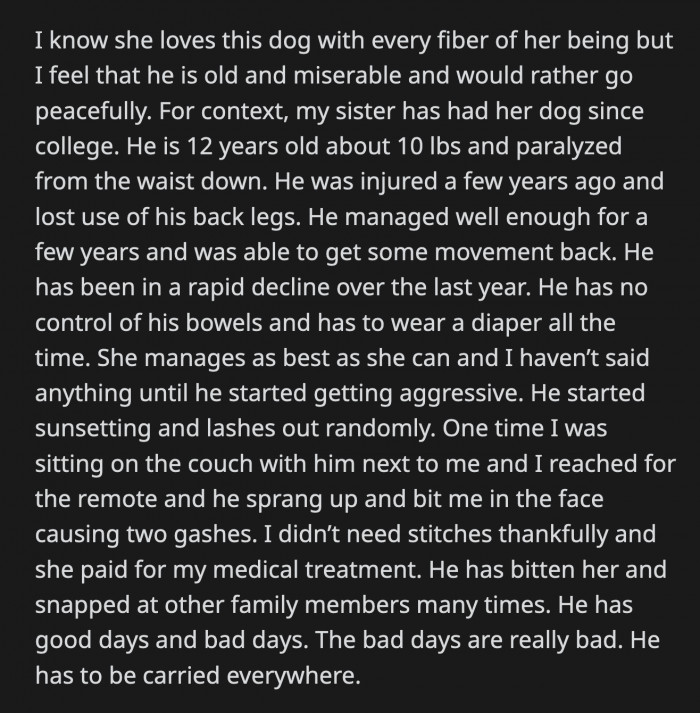
She talked to her sister about taking the dog to the vet for a quality of life check because he randomly snapped again.
Her sister cried and told OP they just need to leave her dog alone to prevent him from getting angry. She got mad at OP for even suggesting euthanasia and shuts down any conversation relating to it.
OP tried to get their other relatives to talk to her about it, but she isn't receptive either. OP loves her sister's dog and has known him his whole life, but she also knows her sister has to do what's best for him, even if that means saying goodbye.
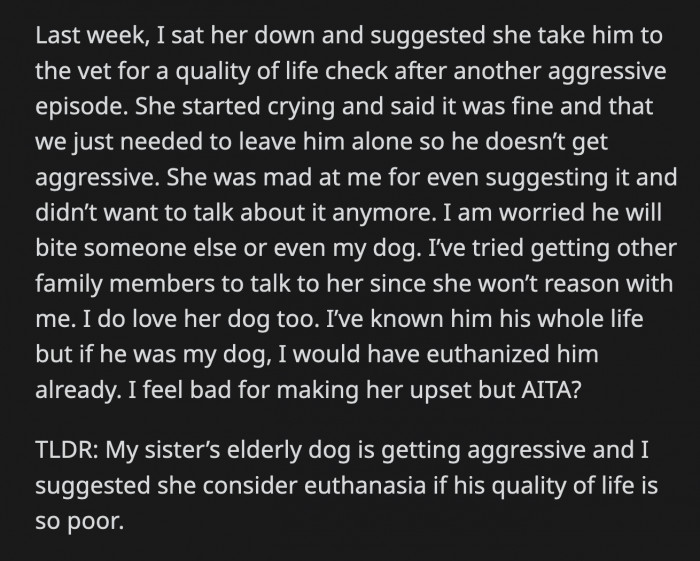
The Difficult Decision of Euthanasia
Deciding to euthanize a beloved pet is one of the most challenging decisions a pet owner can face. Dr. Patricia Evans, a veterinarian and psychologist at Oxford, discusses the emotional turmoil that accompanies this decision, often characterized by guilt and fear of making the wrong choice.
Research indicates that pet owners may experience significant grief and anxiety when considering euthanasia, often feeling torn between their love for the pet and the desire to alleviate suffering.
The Emotional Burden of Euthanasia Decisions
Deciding to euthanize a beloved pet is one of the most emotionally challenging decisions a pet owner can face. Research in the Journal of Veterinary Medicine highlights that pet owners often experience a profound sense of grief and guilt when contemplating this decision.
Understanding the emotional complexities involved in euthanasia can help individuals navigate their feelings and make informed choices that honor their pet's well-being.
Asking their relatives to chime in is not helping either because her sister might feel like she is being attacked by everyone.

The poor dog needs pain meds, and hearing the reality of her dog's suffering from the vet could help wake her up.

It's a difficult choice and one of the worst parts of becoming a pet owner. But when you agree to be the dog's entire world, you also agree to protect it from any harm. That includes protecting them from your own selfishness.
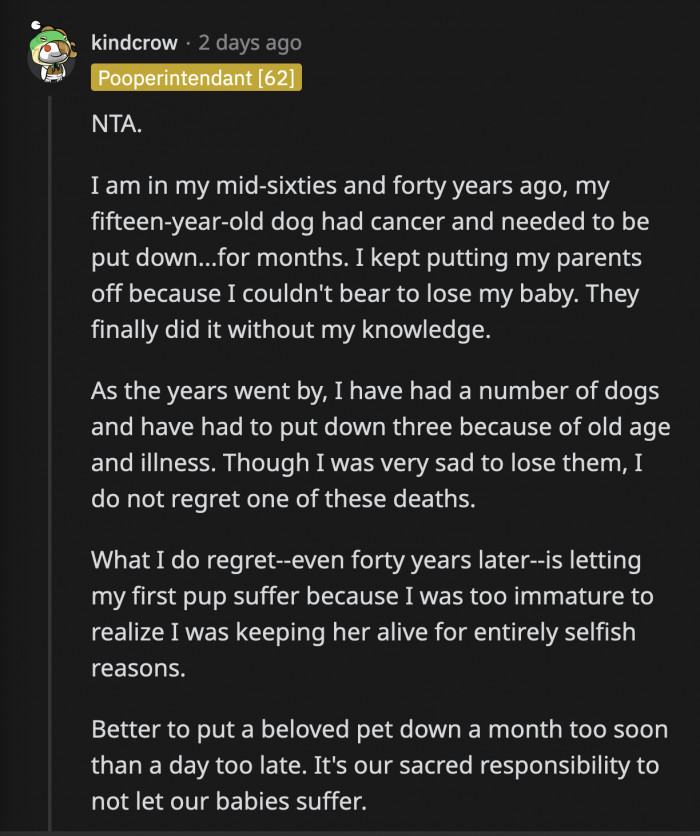
Understanding the signs of suffering in pets is crucial for making informed decisions. Studies show that recognizing pain and distress can empower owners to act in their pet's best interest, ultimately leading to a more compassionate outcome.
Having candid discussions with veterinarians can provide valuable insights and support, helping owners navigate this emotionally charged process.
Moreover, feelings of guilt and fear of making the wrong decision can often amplify the distress experienced by pet owners. A study from the University of Minnesota found that many individuals report feeling conflicted about whether to proceed with euthanasia, fearing they might be acting too soon or too late.
This emotional turmoil underscores the importance of seeking supportive guidance from veterinarians and trusted individuals during this difficult time.
The dog probably can't think clearly, and his aggression could be borne out of the pain he is going through. OP's sister needs to realize this quickly before she subjects her dog to too much pain.
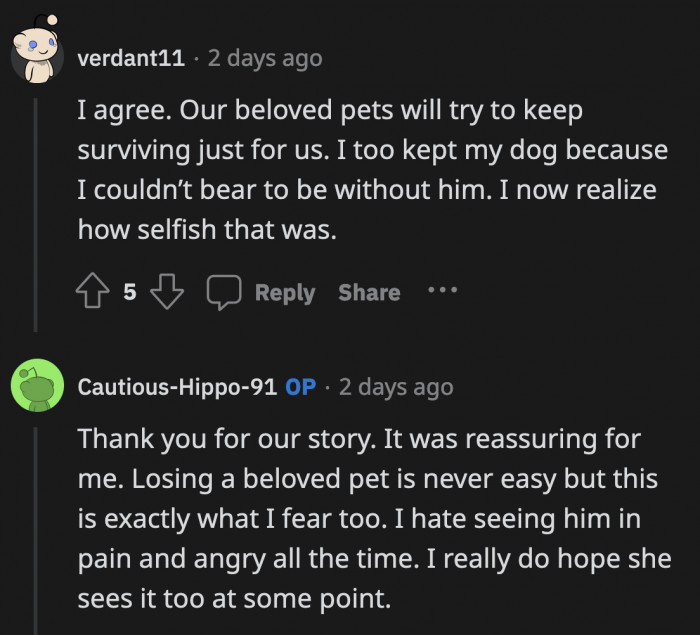
It's also not right to pressure her sister to make a decision immediately; OP has to be patient and give her the grace to accept what she has to do.
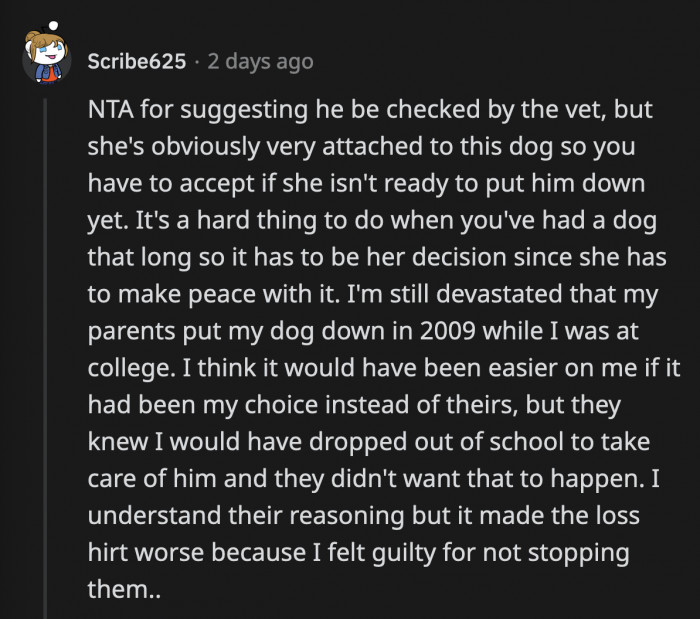
OP said she will never make that decision for her sister; she is simply worried about how her grief will potentially stop her from living her life.
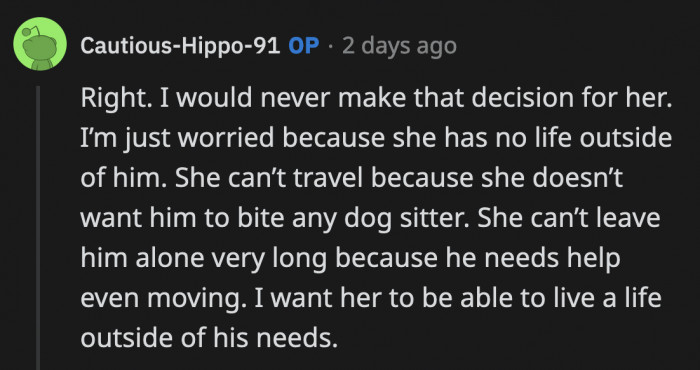
Coping with Grief and Loss
After the loss of a pet, individuals often experience a profound sense of grief that can manifest in various ways. Research in bereavement psychology indicates that the loss of a pet can be as impactful as the loss of a human loved one, with many owners feeling intense sadness and isolation.
Recognizing these feelings as valid is essential for healing, and reaching out for support can facilitate the grieving process.
The Role of Support Systems in Difficult Decisions
Having a supportive network can significantly ease the emotional burden associated with difficult decisions like euthanasia. Research indicates that individuals who share their feelings with others tend to experience reduced anxiety and improved emotional resilience.
In this case, encouraging the sister to seek support from friends, family, or even a therapist could provide valuable perspectives and emotional relief during this challenging period.
OP's hoping that the vet can help her sister face the difficult choice during the dog's annual check in January.
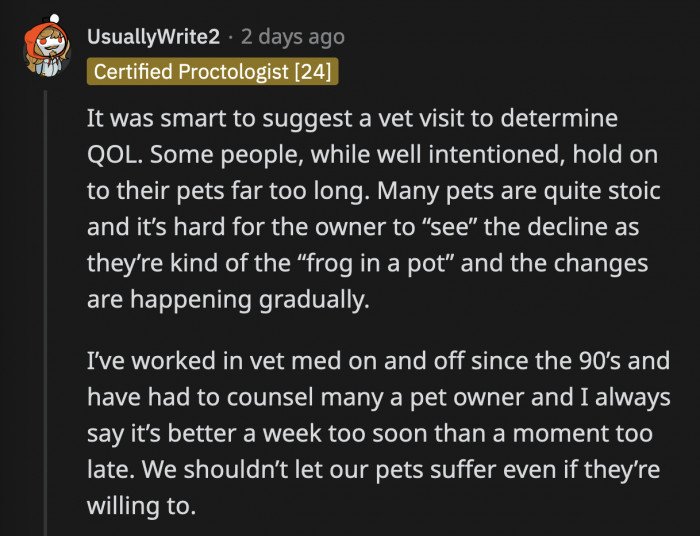
OP's sister has to put her dog's needs above her own pain.
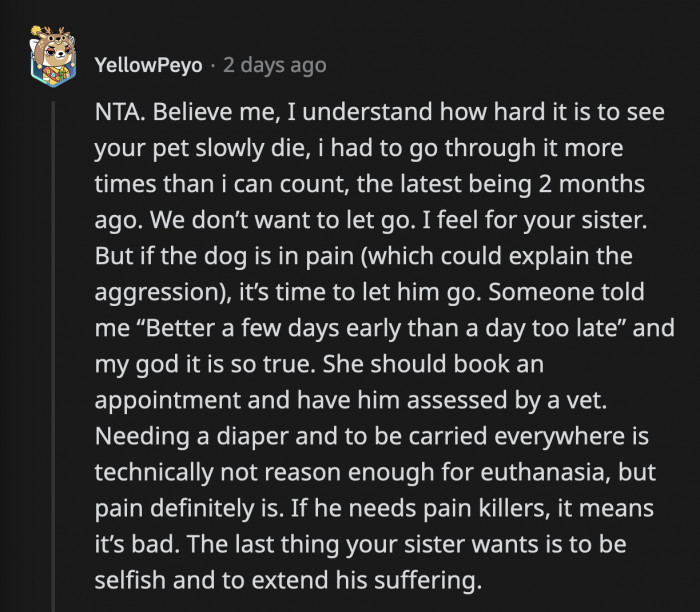
It's a difficult choice, but it is the right one.
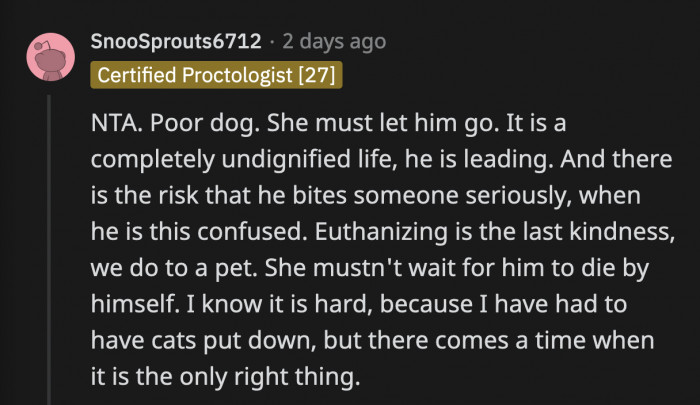
Engaging in support groups or therapy can be beneficial for those navigating the loss of a pet. Studies show that individuals who share their experiences with others often find comfort and understanding, helping to normalize their feelings and promote healing.
Creating memorials or rituals can also provide a meaningful way to honor the pet's life and aid in the grieving process.
Additionally, professional guidance from veterinarians can provide essential insights into the pet's quality of life, facilitating a more informed decision-making process. Studies show that veterinarians can help owners understand their pet's suffering and offer compassionate support throughout the decision.
Establishing a clear communication line with the veterinarian can empower the sister to make a decision that feels right for her and her pet.
OP can't force her sister to do anything. She can only offer her opinion, but she has to respect the choice her sister makes.
She can help her slowly realize the pain that her dog is going through. It's painful to witness a dog's decline, but it is ultimately the owner's choice when to perform the last act of kindness.
Honoring the Pet's Quality of Life
When considering euthanasia, it's essential to assess the pet's quality of life. The 'Quality of Life Scale' is a tool that helps pet owners evaluate their animal's pain, happiness, and overall well-being.
Research supports the use of such scales as effective measures for making compassionate decisions regarding end-of-life care for pets.
Furthermore, understanding that feelings of grief can manifest in various ways can help owners process their emotions. Psychological studies indicate that grief is not linear and can include a range of feelings from sadness to anger.
Recognizing this can help the sister navigate her emotions in a healthy way, allowing for a more compassionate approach to her pet's end-of-life care.
The Importance of Self-Compassion During Difficult Times
Practicing self-compassion is crucial for individuals facing difficult decisions, particularly those involving loss. Research published in the Journal of Clinical Psychology indicates that self-compassion can mitigate feelings of guilt and anxiety, allowing individuals to make more thoughtful choices.
Encouraging the sister to treat herself with kindness during this process can foster emotional healing and resilience, supporting her through this challenging time.
Psychological Analysis
This situation illustrates the emotional complexity surrounding decisions about euthanasia. The sister's difficulty in making a choice reflects the deep bond shared with her pet, emphasizing the need for supportive discussions and guidance.
Encouraging open dialogue about the pet's quality of life can help facilitate a compassionate decision that honors both the pet's needs and the owner's feelings.
Analysis generated by AI
Analysis & Alternative Approaches
Ultimately, navigating the decision to euthanize a pet involves complex emotional dynamics that require careful consideration and support. Research emphasizes that open communication and compassion can significantly ease the burden of such decisions. As Dr. Lisa Feldman Barrett, a leading emotion researcher, states, "Understanding our emotions and those of others can help us navigate difficult choices with greater clarity." Fostering an environment of understanding and empathy, as highlighted on her professional website lisafeldmanbarrett.com, can promote healing during these challenging times.
Analysis & Alternative Approaches
In conclusion, making the decision to euthanize a pet is fraught with emotional challenges and requires careful consideration. Understanding the signs of suffering and reaching out for support are vital steps in this process.
As noted in bereavement research, 'Acknowledging grief and seeking connection with others can pave the way for healing and acceptance.'



